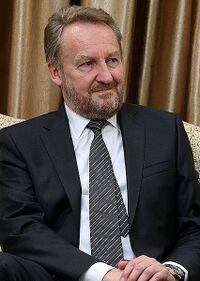Işanguly Mukhamedski
His Excellency Işanguly Mukhamedski | |
|---|---|
 Damir Agapov at a campaign stop, 2015 | |
| Assumed office May 2, 2017 | |
| Vice President | [[]] |
| Preceded by | Terezika Pivec |
| Constituency | Jerusalem-Southwest (1987-2016) |
| Vice-President of Luziyca | |
| In office January 20, 2016 – May 2, 2015 | |
| Representative for Qurultay | |
| In office November 10, 1998 – January 20, 2016 | |
| Personal details | |
| Born | November 1, 1960 (age 64) Nebiozüyük, Crimea |
| Citizenship | Crimean |
| Nationality | Crimean |
| Political party | Democratic Justice Party (1984-present) |
| Spouse | Caliskan Mukhamedska (b. 1963, m. 1999) |
| Children | Ğäbdennasir Mukhamedski Islametdin Mukhamedski Timur Mukhamedski Albinä Bekbulatovich Bakhytzhan Mukhamedski Nurbuke Mukhamedska |
| Alma mater | Haci I Giray University |
| Occupation | Politician, |
Işanguly Mukhamedski (born 1 November 1960, age 59) is a Crimean politician serving as the 12th and current Prime Minister of Crimea. He previously served as Prime Minister of Crimea from 2003 to 2014 and as Mayor of Yalta from 1994 to 1998. He founded the Democratic Justice Party () in 2001, leading it to election victories in 2002, 2007, and 2011 before standing down upon his election as President in 2014. Coming from an Islamist political background and as a self-described conservative democrat, he has promoted socially conservative and populist policies during his administration.
Born in Nebiozüyük, Mukhamedski studied law and political science at Pembroke College, Oxford, before returning to Crimea to enter politics in the wake of the Autumn of Nations. He became head of the reformist student movement the Alliance of Young Muslims (Fiatal Demokraták Szövetsége), which would eventually become the Democratic Justice party. Mukhamedski became a nationally known politician after giving an address at the 1989 reburial of Nursultan and other martyrs of the Crimean rebellion against Russian rule, in which he openly demanded that Crimea be granted independace from the Soviet Union.
Mukhamedski's Islamic democracy, social conservatism, national conservatism, soft Euroscepticism and the abandonment of ties to the United States and the European union in favor of Islamist countries like Turkey and Iran have attracted significant international attention. During his time in government since 2011, Crimea has experienced democratic backsliding, shifting towards authoritarianism.